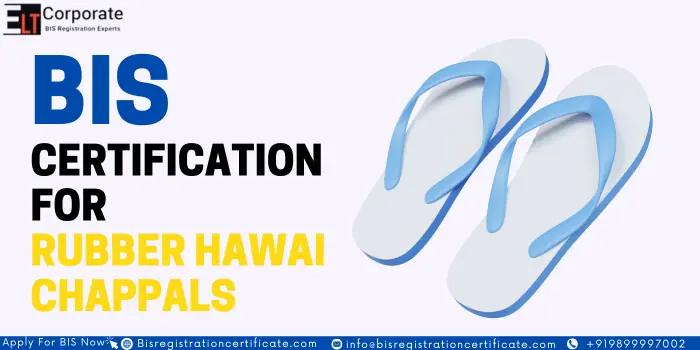Are you a manufacturer or dealer of Rubber Hawai Chappals? Then, here comes the beneficial point: you must understand the BIS registration. BIS Certification for Rubber Hawai Chappals is mandatory for producing Hawai Chappals. Without this license, you are not allowed to manufacture it.
We at ELT Corporate will assist you in obtaining this license and provide expert solutions to all your queries. We have over five years of experience in this industry and have helped numerous clients. You only have to get in touch with us for the BIS Registration.
Here, you will learn about BIS registration, why it is mandatory, and the documentation you need to apply for registration.
Table of Contents
ToggleWhat Is BIS Certification For Rubber Hawai Chappals?
BIS Certification is a legal document that shows that your product meets Indian standards. It is compulsory to obtain this license to show the quality and safety of the product. The license approval is given to the producer after testing and verifying the product.
Understanding The Importance Of BIS Certification
BIS (Bureau of Indian Standards) Certification marks the quality, safety, and reliability of products sold in India. For rubber Hawai, Obtaining BIS certification is a legal requirement and a strategic business move for Chappal manufacturers. With this, you can build trust in the consumer. It shows that your product is designed according to the government’s Indian standards, and consumers can rely on that. This will ensure the consumer about the product quality and safety.
Why Does BIS Certification Matter For Rubber Hawai Chappal Manufacturers?
- Legal Compliance: Rubber Hawai chappals follow the compulsory BIS certification scheme. Manufacturing, selling, or distributing them without the BIS Standard Mark (ISI Mark) is illegal.
- Consumer Trust and Brand Reputation: It assures the consumer that the product meets and tests the specified quality and safety standards. The BIS Standard mark symbolizes trust and safety for consumers. Building trust among consumers helps boost the brand’s sales and market reputation.
- Enhanced Product Quality: The certification process encourages manufacturers to adhere to stringent quality standards, leading to better product design, improved manufacturing processes, and, ultimately, a superior product.
- Competitive Advantage: BIS-certified products gain a competitive edge over non-certified products, as consumers are likelier to choose products that assure quality and safety.
- Access to Government Tenders: Many government tenders require products to be BIS-certified, opening up new business opportunities for manufacturers.
When Should You Obtain BIS Certification for Rubber Hawai Chappals?
Manufacturers should obtain BIS Certification for Rubber Hawai Chappals before manufacturing or selling them in India. This is a mandatory requirement, and non-compliance can result in legal penalties.
Whom Does BIS Certification Apply To In The Rubber Hawai Chappal Industry?
BIS Certification for Rubber Hawai Chappals applies to all manufacturers, importers, and distributors of rubber Hawai chappals in India. Before manufacturing, importing, and distributing, you should apply for a BIS license in India.
Where Can You Apply For BIS Certification For Rubber Hawai Chappal?
You can apply for the BIS certification online or at the nearest BIS branch office. Both options are available, but the BIS application process is complex, so you can seek help from the ELT Corporate BIS Consultancy.
What Documents Are Needed For BIS Certification Process?
The application for the BIS Certification for Rubber Hawai Chappals includes various documents, listed here:
- Application form
- Factory license
- Manufacturing process details
- Test reports from a BIS-approved lab
- Product samples
Having a BIS Registration for Footwear is necessary as without this license, you are not allowed to manufacture, import, or distribute slippers.
Read More: Documents Required For BIS Registration
How To Get BIS Certification For Rubber Hawai Chappal?
To apply for the BIS Certification for Rubber Hawai Chappal, follow the mentioned steps:
- Apply for a BIS license: Submit the application form after adding all the necessary documents as mentioned in the form.
- Factory inspection: For the compliance verification of the standards, the BIS official will visit the manufacturing plant.
- Product testing: The product sample will be tested in the BIS-approved laboratory.
- Grant of license: If the product meets the Indian standards, the BIS official will issue the BIS License.
- Use of Standard Mark: Affix the BIS Standard Mark (ISI Mark) on your product and packaging.
Read More: How to apply for BIS certificate
What Is The Validity Of BIS Certification?
The BIS Certificate is valid for one year later; you have to apply for the license renewal. The license renewal depends on how many years you need to renew it.
What Is The Timeline of BIS Certification?
The timeline for BIS certification is 5 to 7 months.


